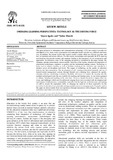| dc.description.abstract | The great advances in information and communication technology (ICT) have made it possible for
individuals to live, learn, work, communicate and undertake leisure activities in a different and better
way. In addition, the current world order requires quality systems which are efficient, accurate, and
fast for operation and service delivery. For this reason, technologies and especially the ICTs open up new horizons that provide avenues and strategies leading to the emergence of new perspectives and approaches. In education, some of the emerging perspectives considered in the paper include: the changing learning environments, learner profiles, and roles of the teacher; adoption and integration of educational technologies; emphasis on quality; and the institutional ranking systems. Technology isbeing used to enhance learning as well as facilitate teaching in the classroom and virtually at a distance across all disciplines and levels. The impact of technology on the quality of education delivery has been tremendous. The development of self -learning instructional materials and use of learner/content management systems through blended and e-learning have enhanced the quality, structure, delivery, monitoring, evaluation, flexibility and access to content. By levering into the multiple technological tools that are available for teaching and learning today, we are better equipped to enhance learning and teaching at the same time. However, despite the positive impact, there are issues and challenges which must be addressed, ranging from costs associated with development and maintenance of infrastructure, sustainability especially with the high rate of obsolescence and training of staff to acquire the appropriate skills, to changing the mind-set of those responsible for the provision of education to accommodate and appropriately invest in emerging trends. Examples used in the paper are drawn mainly from our experiences through interactions with colleagues from different institutions and within our work environments.
Key words:Education technology, Quality, Emerging perspectives | en_US |

